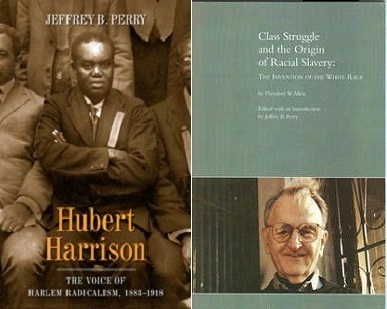Hubert H. Harrison (1883-1927) and Theodore W. Allen (1919-2005) were both autodidactic, anti-white supremacist, working-class intellectuals. Though influential in their day (Harrison was extremely influential), their work has not received the wide-scale attention it merits for a host of reasons including that they lived and worked in poverty among the oppressed and exploited; they held no academic positions; they were critics of powerful forces and people; they were forthright and principled (though not mean-spirited) critics of positions that they did not agree with – including positions put forth by prominent academics, individuals, and organizations; and they had no major organizational ties in later life. In addition, Harrison faced white supremacist, anti-immigrant, anti-Caribbean, and color discriminations.
The most important reasons that Harrison and Allen are not better known, however, are that their analyses were so penetrating and so radical (particularly on race and class), they encouraged putting their ideas into practice, and they functioned in the most powerful country in the world – where numerous ways are found to marginalize, minimize, trivialize, ignore, or silence, such views and social practices. While Harrison was mostly ignored and neglected for many years after his death, Allen’s writings were often mischaracterized, misunderstood, or misapplied by those who either dismissed them or drew from them for their own work.
Hubert Harrison and Theodore W. Allen pointed to white supremacy as the historic principal retardant to social change efforts in the U.S. They emphasized that struggle against white supremacy was central to efforts at social change. Given the unfolding conjuncture and the directness and clarity with which they addressed issues of race and class, their insights deserve considerable attention, particularly from those interested in efforts to end white supremacist bourgeois domination in the United States.
For more on this see Jeffrey B. Perry, “The Developing Conjuncture and Some Insights From Hubert Harrison and Theodore W. Allen on the Centrality of the Fight Against White Supremacy,” in “Cultural Logic,” at http://clogic.eserver.org/2010/2010.html
Jeffrey B. Perry
The most important reasons that Harrison and Allen are not better known, however, are that their analyses were so penetrating and so radical (particularly on race and class), they encouraged putting their ideas into practice, and they functioned in the most powerful country in the world – where numerous ways are found to marginalize, minimize, trivialize, ignore, or silence, such views and social practices. While Harrison was mostly ignored and neglected for many years after his death, Allen’s writings were often mischaracterized, misunderstood, or misapplied by those who either dismissed them or drew from them for their own work.
Hubert Harrison and Theodore W. Allen pointed to white supremacy as the historic principal retardant to social change efforts in the U.S. They emphasized that struggle against white supremacy was central to efforts at social change. Given the unfolding conjuncture and the directness and clarity with which they addressed issues of race and class, their insights deserve considerable attention, particularly from those interested in efforts to end white supremacist bourgeois domination in the United States.
For more on this see Jeffrey B. Perry, “The Developing Conjuncture and Some Insights From Hubert Harrison and Theodore W. Allen on the Centrality of the Fight Against White Supremacy,” in “Cultural Logic,” at http://clogic.eserver.org/2010/2010.html
Jeffrey B. Perry
